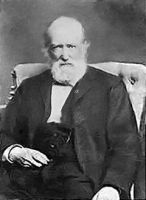| Hans Theodor Woldsen Storm | |||
| 奥多尔·沃尔特森·施笃姆 | |||
| 汉斯·台奥多尔·沃尔特森·施托姆 | |||
Read works of Theodor Storm at 小说之家 | |||
He was born in Husum (die graue Stadt am grauen Meer, "the grey town by the grey sea") on the west coast of Schleswig-Holstein of well-to-do parents. While still a student of law, he published a first volume of verse together with the brothers Tycho and Theodor Mommsen.
He worked as a lawyer in Schleswig-Holstein, but emigrated to Thuringia in 1851 after the commencement of Danish rule, leaving his mother's household, and did not return until 1864, after Schleswig-Holstein had returned to Germany.
He wrote a number of stories, poems and novellas. His two most well-known works are the novellas Immensee ("Bees' Lake", 1849) and Der Schimmelreiter ("The Rider on the White Horse"), first published in April 1888 in the Deutsche Rundschau. Other published works include a volume of his poems (1852), the novella Pole Poppenspäler (1874) and the novella Aquis submersus (1877).
Analysis
Theodor Storm, like Friedrich Hebbel, was a child of the North Sea Plain, but while in Hebbel's verse there is hardly any direct reference to his native landscape, Storm again and again revisits the chaste beauty of its expansive mudflats, menacing sea and barren pastures — and while Hebbel could find a home away from his native heath, Storm clung to it with what might be called a jealous love. In Der Schimmelreiter, the last of his 50 novellas and widely considered Storm's culminating masterpiece, the setting of the rural North German coast is central to evoking its unnerving, superstitious atmosphere and sets the stage for the battleground of man versus nature - the dykes and the sea.
His favorite poets were Joseph von Eichendorff and Eduard Mörike, and the influence of the former is plainly discernible even in Storm's later verse. During a summer visit to Baden-Baden in 1864, where he had been invited by his friend, the author and painter Ludwig Pietsch, he made the acquaintance of the great Russian writer Ivan Turgenev. They exchanged letters and sent each other copies of their works over a number of years.
Storm died in Hademarschen, Germany at the age of 70.
Samples
House of Theodor Storm in Husum
Die Stadt The town
Am grauen Strand, am grauen Meer
Und seitab liegt die Stadt;
Der Nebel drückt die Dächer schwer,
Und durch die Stille braust das Meer
Eintönig um die Stadt. By the gray shore, by the gray sea
—And close by lies the town—
The fog rests heavy round the roofs
And through the silence roars the sea
Monotonously round the town.
Es rauscht kein Wald, es schlägt im Mai
Kein Vogel ohn' Unterlaß;
Die Wandergans mit hartem Schrei
Nur fliegt in Herbstesnacht vorbei,
Am Strande weht das Gras. No forest murmurs, and no bird sings
Unceasingly in May;
The wand'ring goose with raucous cry
On autumn nights just passes by,
On the shoreline waves the grass.
Doch hängt mein ganzes Herz an dir,
Du graue Stadt am Meer;
Der Jugend Zauber für und für
Ruht lächelnd doch auf dir, auf dir,
Du graue Stadt am Meer. Yet all my heart remains with you,
O gray town by the sea;
Youth's magic ever and a day
Rests smiling still on you, on you,
O gray town by the sea.
(Analysis and original text of the poem from A Book of German Lyrics, ed. Friedrich Bruns, which is available in Project Gutenberg at UNC.edu
